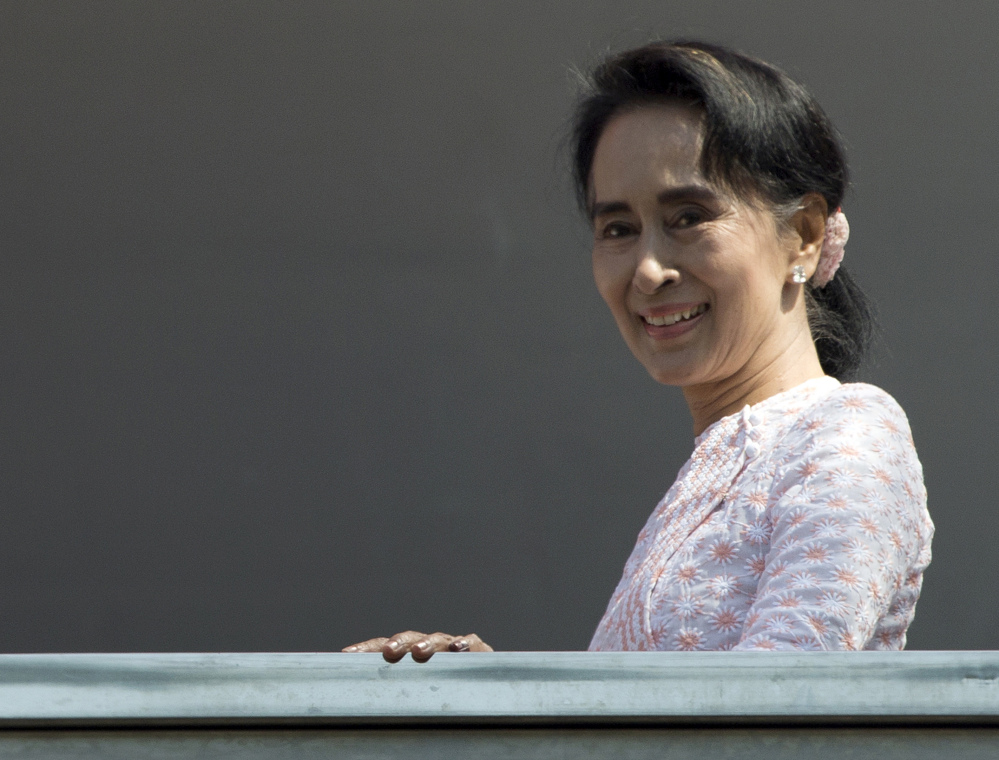YANGON, Myanmar — On the fifth anniversary of her release from house arrest, election results Friday showed that Aung San Suu Kyi’s opposition party had won enough seats in Parliament to allow it to form Myanmar’s first truly civilian government in more than half a century.
While complete results from Sunday’s vote still must be tallied, the state election commission announced that Suu Kyi’s National League for Democracy party had won 37 additional seats – pushing it over the threshold of 329 seats needed for a majority in the two-house Parliament.
The party with a combined parliamentary majority is able to select the next president, who can then name a Cabinet and form a new government. The 329 figure represents a majority in the 664-member Parliament because voting was not held in seven constituencies due to unrest in the Southeast Asian country.
The ruling military-backed Union Solidarity and Development Party had won just 40 seats as of Friday.
The transfer of power should take place after the new Parliament meets early next year and votes on a new president, along with two vice presidents.
The NLD will face a variety of challenges, not least of which is the huge tide of pent-up expectations evidenced by the vote. Its lack of experience in public administration is another big question.
But the victory is a sweet second chance for the party, which also won a landslide victory in the first election it contested, in 1990, only to see the results annulled by the military, and many of its leading members harassed and jailed.
Suu Kyi herself was put under house arrest prior to the 1990 election, and spent 15 of the next 22 years mostly confined to her lakeside villa in Yangon. She was under house arrest when she won the 1991 Nobel Peace Prize.
Few expect the army to put up that kind of roadblock again. It is committed to the economic opportunities of a newly globalized country that encourages foreign trade and investment, and has written provisions into the constitution that guarantee it a leading role in running the country. The military automatically receives 25 percent of the seats in each house of Parliament.
A major issue for the NLD will be how to deal with Myanmar’s fractious ethnic minorities, who for decades have been conducting on-again, off-again insurgencies seeking greater autonomy. In opposition, the NLD had a loose alliance with such groups, but in power, it will have to make hard choices about how to balance national, military and minority interests.
Religious and racial tensions involving the ethnic Rohingya minority and other Muslims – a cause of deadly clashes that have left as many as 140,000 people internally displaced – are another challenge, complicated by the nationalist politicking of influential radical Buddhist monks.
Send questions/comments to the editors.



Success. Please wait for the page to reload. If the page does not reload within 5 seconds, please refresh the page.
Enter your email and password to access comments.
Hi, to comment on stories you must . This profile is in addition to your subscription and website login.
Already have a commenting profile? .
Invalid username/password.
Please check your email to confirm and complete your registration.
Only subscribers are eligible to post comments. Please subscribe or login first for digital access. Here’s why.
Use the form below to reset your password. When you've submitted your account email, we will send an email with a reset code.